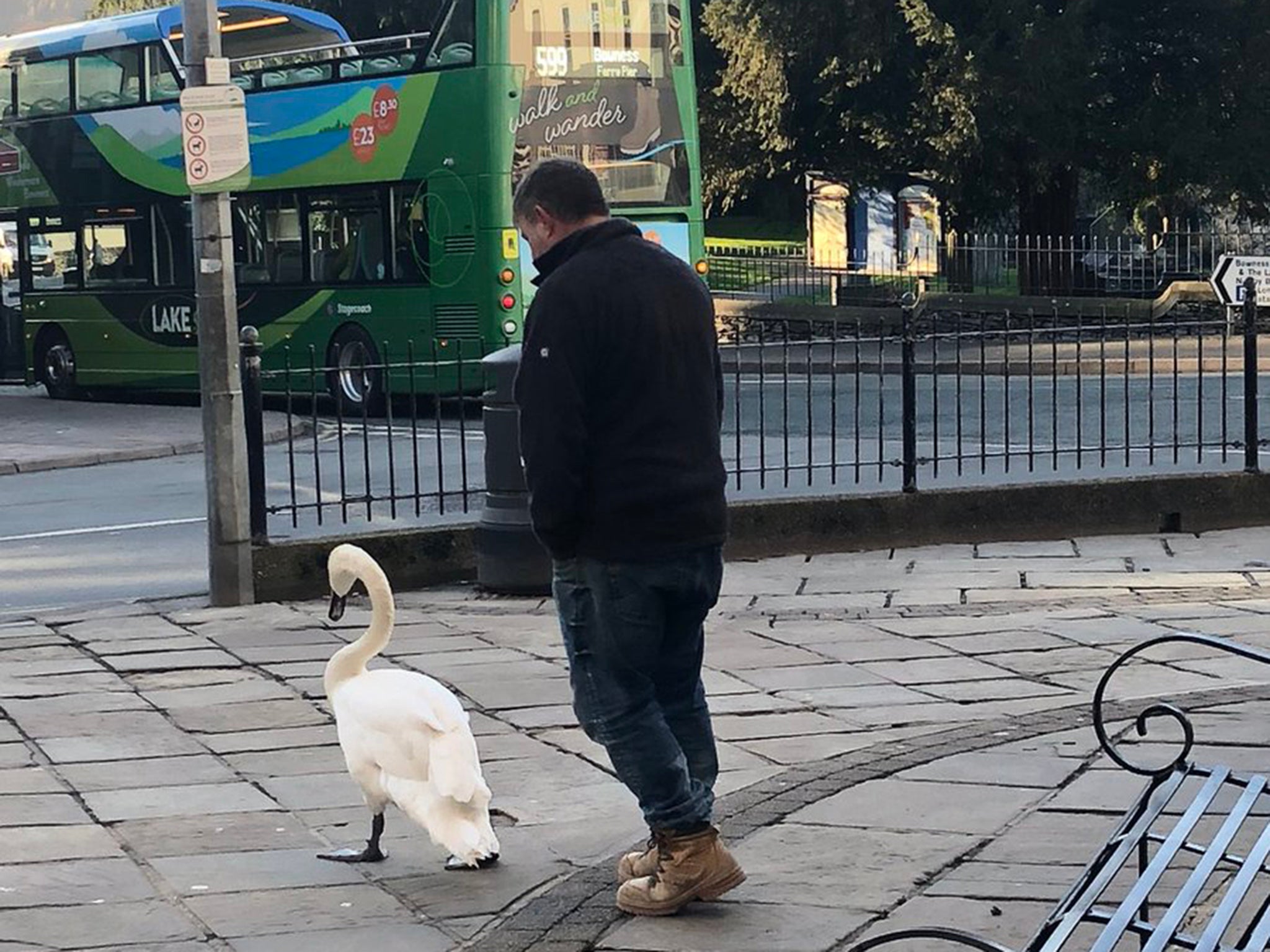Swans hunt for junk food in bins after tourists told to stop feeding them
Birds spotted loitering outside a supermarket and fast food outlets in Lake District town of Bowness-on-Windermere

Your support helps us to tell the story
From reproductive rights to climate change to Big Tech, The Independent is on the ground when the story is developing. Whether it's investigating the financials of Elon Musk's pro-Trump PAC or producing our latest documentary, 'The A Word', which shines a light on the American women fighting for reproductive rights, we know how important it is to parse out the facts from the messaging.
At such a critical moment in US history, we need reporters on the ground. Your donation allows us to keep sending journalists to speak to both sides of the story.
The Independent is trusted by Americans across the entire political spectrum. And unlike many other quality news outlets, we choose not to lock Americans out of our reporting and analysis with paywalls. We believe quality journalism should be available to everyone, paid for by those who can afford it.
Your support makes all the difference.Swans are wandering over a mile into a Lake District town to raid bins for junk food after unofficial signs were erected warning people not to feed them.
The birds are leaving Lake Windermere and making their way to a Tesco supermarket and fast food outlets in Bowness-on-Windermere where they scavenge for scraps.
Some residents have complained that the size of the swans is intimidating for pedestrians and there is a concern they could be hit by cars or attacked by dogs.
The swans appear to have started making their way into the town centre after signs appeared around Lake Windermere reading: "Please don't feed the ducks, geese and swans bread or fast food."
Visitors to the lake have for years, thrown chips and scraps of bread to the birds from the jetty and beach.
During a recent visit to Bowness-on-Windermere, Karen Geldard from Leicester, said she spotted a man escorting a swan back to the lake after it had wandered into the town centre.
"It’s an unusual sight and not one I’ve seen before in many visits to the area, " she said. "I was just very thankful a kind hearted gentlemen was ensuring it was safely returned to the lake. He made sure traffic stopped when crossing roads."
Ian Wilkinson, who works at Windermere Lake Cruises told The Times: "The problem was that everybody was feeding them and someone, nobody knows who, has put the sign up and now the swans are not getting what they want. I dread to think what the swans are eating up in town."
A Tourist Information spokesman confirmed that the notices were unofficial and had nothing to do with South Lakeland Council or the Lake District National Park.
Some residents have suggested that the swans are specifically seeking out the chips and bread they used to be fed by visitors at the lake.
But RSPB Spokesperson Martin Fowlie said that rather than developing a taste for a particular type of food, swans are more likely to seek a reliable source of food.
Marian Jones, area ranger for the Lake District National Park Authority, advised people not to feed the birds.
She said: “We work with a number of organisations and key landowners including the RSPCA and South Lakeland District Council to help manage the impact of waterfowl on Windermere. One of the reasons swans and other birds are attracted to Bowness is because they’re being fed by locals and visitors in the area.
“Unfortunately, this can cause health problems for the birds and make them tame, which can put them at risk from traffic and dogs. To protect these birds and reduce the risk of accidents, we advise people to not feed them.”
Annabel Rushton, a spokesperson for the RSPB in Cumbria, added that fast food should not be fed to swans.
"Just like us humans, it is not good for them and its grease can get stuck to their feathers making it difficult for them to preen, which they need to do to keep their feathers waterproof," she said. "Bread can act as an empty filler, so although it isn't harmful to birds as such, it should only be fed in small amounts as its nutritional value is relatively low.
"What can often happen in public spaces is that swans and ducks can end up on a diet of predominantly or entirely bread and so can suffer from serious vitamin deficiencies from a lack of balanced diet. Better alternatives include bird seed, halved grapes, potatoes, and greens like spinach, to try and provide a more varied, more natural diet than bread."
She added: "For many people, feeding swans and ducks in a local park is an important connection to our natural world, and we need to encourage this as it is so important for our wellbeing and mental health. We just need to do it in a way that is best for the birds.”
Join our commenting forum
Join thought-provoking conversations, follow other Independent readers and see their replies
Comments